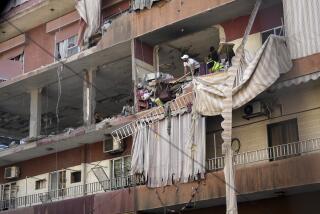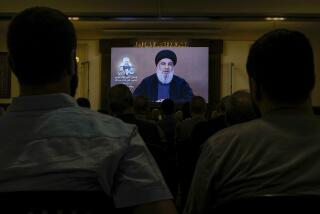Jordan’s King Sees Pitfalls in a Strike on Iraq
WASHINGTON — Jordan’s King Abdullah II is urging the Bush administration to abandon ideas of taking on the regime of Saddam Hussein, predicting that any U.S. military action against Iraq could produce an “Armageddon” in the Middle East.
In a telephone interview as he arrived in California for a visit that began this weekend, Abdullah warned that a U.S.-led operation could too easily go “completely awry” and even backfire, producing a civil war in Iraq that could involve neighboring countries--and even have a ripple effect in the United States and Europe.
“It’s the potential Armageddon of Iraq that worries all of us, and that’s where common sense would say, ‘Look, this is a tremendously dangerous road to go down,’ ” Abdullah said in his first interview since Vice President Dick Cheney visited him last week to discuss Iraq and the Israeli-Palestinian crisis. “If our aim is to win against terrorism, we can’t afford more instability in the area.”
The king’s words were blunter than a Jordanian government statement after the Cheney meeting. And coming from one of the closest U.S. allies in the Arab world, his warnings are particularly ominous as the Bush administration begins sorting through the options in its pledge to confront Hussein as part of the next stage in the war on terrorism.
Abdullah, 40, the symbol of the region’s new generation of leaders, is a pragmatist who has sought to bridge cultures and push for political reform in the region. But on Iraq, he sees no room for compromise, reflecting the now clear-cut position of the majority of Arab leaders.
“A strike against Iraq, the potential fragmentation of Iraq, the potential nightmare of a civil war as a result of an American strike, is something that I don’t think the region can handle,” he said.
As Cheney is finding on his continuing tour of the region, the potential aftermath of a change at the top in Iraq--after a U.S. departure--is what most worries Arab regimes, a fear based in part on the long history of coups and counter-coups in Baghdad before Hussein came to power. Iraq’s neighbors are particularly worried about a new period of massive instability, Abdullah says.
“Once you go down the road of violence, it is very, very difficult to control it,” he said. “If the region explodes, Europe and the West are going to have to get involved.”
The king disputed comments from some U.S. officials that Arab leaders, while resisting U.S. proposals to act against Iraq in public, were acquiescing in private discussions.
On CNN on Saturday, Deputy Secretary of Defense Paul D. Wolfowitz said that Mideast leaders have a long history of saying one thing in public but doing another.
But Abdullah said that on the Iraq issue, the majority of leaders had been “transparent and honest” about their deep concern over what could be the consequences of a U.S. strike against Baghdad.
“I really wouldn’t make that assumption that there are different policies behind closed doors--it’s unfair to say that,” he said. “Most of us strongly believe that dialogue is the way to go to try to solve the problem.”
As a result, Abdullah and other Arab leaders have been pressing Iraq in recent days to comply with the United Nations and allow inspectors into the country to resume their mission of searching for and destroying weapons of mass destruction.
The king met last Sunday with Izzat Ibrahim, deputy chairman of Iraq’s ruling Revolutionary Command Council, to press Baghdad to end its stonewalling on the inspections.
Arab leaders, as well as European, Russian and Chinese officials, had been “very blunt, very straightforward” in delivering this message, he added. After his meeting with Ibrahim, he said, he believed that the Iraqi leadership is “beginning to get the message.”
Abdullah also said the United States would be making a mistake to think that its military success in Afghanistan could be a blueprint for action against Iraq. The vastness of Iraq, its strategic location and oil wealth, its mix of ethnic and religious groups and, in particular, the regional dynamics presented far more complex challenges than those in Afghanistan, he said.
During the rule of his father, King Hussein, Jordan sat out the 1991 war with Iraq to liberate Kuwait, in large part because of pressure from its own population. But in the mid-1990s, King Hussein lashed out at Baghdad and allowed Iraqi dissidents to be based in the Jordanian capital, Amman.
Jordan is now home to about 250,000 Iraqi refugees, Abdullah said.
Jordan, which is trying to open up both politically and economically to provide a new model for the region, remains dependent on Iraq for discounted oil. Being cut off would cost Amman about $500 million a year, according to Jordan’s foreign minister.
In his wide-ranging comments, Abdullah struck a more optimistic note on the Arab-Israeli conflict. Based on intense behind-the-scenes discussions, he predicted that an Arab League summit next week would give across-the-board support to the Saudi Arabian proposal to offer Israel full recognition from the 22-member bloc in exchange for withdrawal from territories it has occupied since the 1967 Middle East War. The king said Ibrahim told him that even Iraq would not oppose the Saudi effort.
But Abdullah said that any attempt by Israel to prevent Palestinian Authority President Yasser Arafat from going to the summit in Beirut would make it difficult for the Arab world “to do what’s positive and possible.”
“There could be nothing worse for us moderates but that [Arafat] is still held hostage in the West Bank when the moderates are really trying to say that peace with Israel is in our strategic future,” he said.
On Islamic extremism, Abdullah warned that the struggle to contain the threat would take at least the next two decades. The Sept. 11 attacks on the United States were a wake-up call in the Islamic world about the scope of the problem, he said.
The major dangers ahead, he predicted, would come not from the Arab world but from Asia, where Osama bin Laden has been promoting radical and erroneous interpretations of Islam among people who do not speak the language of the Koran.
“In the Middle East, the battle will be easier won because Arabic is the first language. Where it will be much harder to do this is in Asia, where the majority of Muslims don’t speak Arabic as a first language and the Osama bin Ladens have had a head start on us. That’s where the heart of the battle is,” he said.
More to Read
Sign up for Essential California
The most important California stories and recommendations in your inbox every morning.
You may occasionally receive promotional content from the Los Angeles Times.










